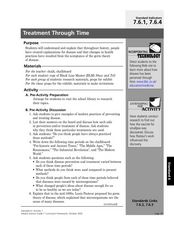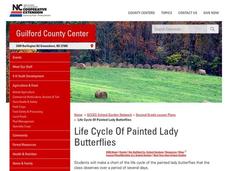Curated OER
Global Warming
First graders discover the effects of global warming on polar bears. In this life science lesson, 1st graders model the polar bear's habitat and observe what happens as they raise the temperature. They record their observation in the...
Curated OER
Cooking Up the Scientific Method
First graders identify the different steps of the scientific method. In this life science lesson, 1st graders apply this method when conducting a series of hands-on activities. They collect data and write observations in their journals.
Curated OER
What About Cantaloupes?
Second graders investigate the physical properties of cantaloupe using their senses. In this life science activity, 2nd graders estimate the weight of their sample. They get it's actual weight and compare it with their estimate.
Curated OER
What on Earth?
Second graders investigate the different living and nonliving things they can find on Earth. In this life science lesson, 2nd graders record their observations as they dig into the soil. They examine them under the magnifying glass and...
Curated OER
Do You Need What I Need?
Student identify the basic human needs. In this life science instructional activity, 3rd graders compare the needs of plants, animals and humans. They apply what they have learned by playing a survival team game.
Curated OER
Look Alikes
Third graders compare and contrast the physical features of parents and offspring. For this life science lesson, 3rd graders classify a set of animal pictures according to their similarities. They share and explain their work in class.
Curated OER
Body Battles!
Seventh graders explain the role of white blood cells in fighting infections. In this life science instructional activity, 7th graders create flow charts showing the immune response process. They act out and play a game to simulate...
Curated OER
What a Fungi
Seventh graders perform an experiment to determine the best growing conditions for molds. In this life science lesson, 7th graders explain where molds are commonly found. They collect data and draw diagrams of their observations.
Curated OER
Treatment Through Time
Seventh graders explore how disease prevention and treatment changed throughout history. In this life science lesson, 7th graders create a classroom exhibit about this topic. They present their project to visitors.
Curated OER
Parental Genes
Eighth graders explore how different organisms pass their traits to their offspring. In this life science lesson, 8th graders differentiate recessive and dominant alleles. They predict the phenotype based on the genotype of an organism.
Curated OER
Flower Power
An engaging, multi-session art and science lesson awaits your class. Within this lesson, you'll find everything you need to implement the plan. They go on a nature walk around their school, and must identify many living and non-living...
Curated OER
The Search for El Nino
Sixth graders complete an El Nino scavenger hunt. In this earth science activity, 6th graders describe the conditions that create El Nino and compare it to normal condition. They discuss how this phenomenon affects marine ecosystem.
SurfScore
Kodable
Prepare young scholars for life in the twenty-first century with this introduction to computer coding formatted as a fun problem solving game, this resource is a great way to develop children's sequential thinking skills.
Baylor College
Neural Network Signals
Using a simple circuit with the battery representing the brain, future physiologists test to see which solutions conduct electrical "nerve impulses." Enlighten learners with plentiful information on electric signals in the nervous system...
Curated OER
Conditioning and Storing Cut Flowers and Greens
Flower storage is an important topic if you are working with flowers. Consequently, this series of slides will be useful for those who are studying floral arranging. The information provided in this presentation could be used to enhance...
Baylor College
Crossing the Synaptic Gap
As part of a unit on the chemistry of the brain, thinkers learn how chemicals work to transmit messages between individual neurons and how controlled substances impact the synaptic cleft. They do so by playing a dice-and-card game in...
Baylor College
Tools of Magnification
Life science learners need to be able to use a microscope. With this comprehensive resource, they first experience how lenses and magnification work, and then get familiar with using a compound microscope. Tremendous background...
Scholastic
Study Jams! Aquatic Ecosystems
Mia's friends are fish-sitting while she is away on vacation. Zoe divulges to Sam that different animals need different habitats, and that there are both freshwater and saltwater ecosystems. Examples of the kinds of organisms found in...
Curated OER
Marine Life: Anatomy of a Humpback
Third graders prepare for a trip to view marine life. In this science lesson plan, 3rd graders assemble a picture of a Humpback whale on a grid.
Curated OER
Life on Mars
Students research the feasibility of life on Mars and debate what it would need in order to sustain life. They work in teams to predict, research, infer, and explain their theory using models they build.
Curated OER
National Marine Sanctuaries Shipwrecks
Junior oceanographers access the Channel Islands National Marine Sanctuary Shipwreck Database and plot the locations of several shipwrecks. Shipwrecks are always an enthralling subject and this activity allows your learners to act as...
NC Cooperative Extension, Guilford County Center
Life Cycle Of Painted Lady Butterflies
The Very Hungry Caterpillar is the inspiration for this project-based learning activity. Kindergartners create a lifecycle chart for a butterfly with four sections: egg, caterpillar, pupa, and butterfly. It is a three-dimensional...
Shodor Education Foundation
Life
How does life evolve? The interactive provides a simulation based on the Game of Life invented by mathematician John Conway. Users can run the applet with the preset rules and settings or adjust them to view whether overpopulation or...
American Museum of Natural History
The Tree of Life
Groups of species can have more in common than meets the eye. An interactive cladogram shows some of the connections between important groups of species. Learners click on sections of the diagram to learn more about the connections or on...

























